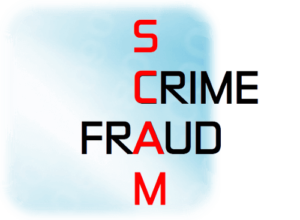By Jonathan Lyster
November 17, 2018
 These common computer scams are being seen often by the clients I deal with daily in the Parksville/Qualicum area. Odds are excellent you have experienced some kind of attempted scam yourself in recent years. Efforts to extract money from your wallet get more sophisticated as each year passes.
These common computer scams are being seen often by the clients I deal with daily in the Parksville/Qualicum area. Odds are excellent you have experienced some kind of attempted scam yourself in recent years. Efforts to extract money from your wallet get more sophisticated as each year passes.
1. The "Microsoft" Scam
First on our list of common computer scams is the infamous "Microsoft" scam. A voice on the phone tells you Microsoft has detected a problem with your computer. They are eager to help you fix it. The "technician" leads you through a process that gives him access to your computer. He (it’s most often a man) may then bring up a list of errors that suggest your computer is about to fail at any moment. He might even warn you it could burst into flames and burn your house down. Fortunately, the technician says, he can fix the problem for the low, low price of $300 or $500. If this happens, a scammer has targeted you.
How It Works
At any given time, millions of people are having computer trouble: a glitch that requires a restart, a frozen application, wifi that isn't working properly. Most of those computers use Microsoft Windows software. The scammers count on you associating any problem you are having with their phone call. The calls are actually random, but they make money if they can fool even a small percentage of those they call. After all, Microsoft should know your computer has a problem since they created the operating system, right? Wrong. Microsoft has no way of knowing that your particular computer, out of so many systems around the world, is having an issue. One refinement I’ve encountered in this scam: phone number spoofing. Phone spoofing means your call display will show a number other than the callers real number. Here in Canada you may see the number for Microsoft Toronto. The scammers tricked your call display into showing you Microsoft’s number, even though they are calling from a completely different location -- even from outside the country.
Avoiding The Scam
Avoiding this con job is simple: if you get a call claiming to be from Microsoft, hang up and go back to your life. If you fell for it, however, and supplied the thieves with banking or credit card information, contact your financial institution immediately. Have them cancel your credit card and stop any payments made to the scammers.
2. The "CRA" Scam
A threatening voice on your phone says you owe the Canada Revenue Agency unpaid taxes and, if you don’t pay them right now, you’ll go to prison. An automated voice will typically give you a phone number to call. If you phone that number, the person on the line will ask for your credit card information. Or they will demand that you purchase gift cards such as Apple iPhone cards as payment.
How It Works
We all hear stories about people discovering they owed the government more than they expected. This con job plays on the fear of that happening to you. Common computer scams are built around fears. If you're afraid, you're less likely to think rationally. If you’re concerned that you may actually owe the Canadian government money, visit the CRA’s web site and contact them directly to find out.
Avoiding The Scam
If someone claiming to be from the CRA calls you, remember that government staff already have your information. If they ask for any personal information, even if they claim it's to verify your identity, refuse to give it. Hang up. The CRA sometimes calls Canadians but you can tell anyone claiming to represent the CRA that you will go to the CRA website and contact them using the information there. The CRA does not accept payments in any form but money. They will never ask you to send them gift cards of any kind.
3. The "You have a virus!" Scam
You’re surfing the web when a box suddenly appears on your screen saying, "You have a virus. Call this number to get rid of it." The page may claim to be from Microsoft. In fact, the page may even look a lot like Microsoft’s own web page. If you’re using a Mac, the page may look like Apple’s web site. Worst of all, you can't leave the page. It must be serious if Microsoft or Apple won't even let you close the virus warning!
How It Works
What you have encountered here is a web page hijacked by scammers to give them access to anyone browsing that site. The site you visited can be of any type. Perhaps you were looking up recipes when the message box appeared. Even sites you have visited a hundred times can be suddenly hijacked in this way.
Avoiding The Scam
It’s almost impossible to avoid this type of con job, because these scams take advantage of websites with weak security and you can't control whether sites you visit are being properly maintained. The scam doesn't involve the scammers slipping something into your computer. It just tries to fool you into believing something was. Your antivirus or malware software won’t detect a problem because there is no problem. The web site you visited has been hijacked, but your computer hasn't. You’re simply looking at a web page telling you your computer has been infected. This would be like a random stranger on the street stopping you and saying, "You have a virus on your computer. If you give me your VISA card number, I can make it go away." You'd probably just laugh and carry on with your day and that is exactly what you should do here. When you get hit with this scam, you may find that you can’t close the page showing the virus message. Not to worry. On a PC computer, press your CTRL, ALT, and DELETE keys all at the same time. You should see a blue screen showing several options. The option at the bottom of the list is "Task Manager." Select this. You’ll now see a box that displays applications currently running on your computer. One of those applications will be your web browser: Internet Explorer, Firefox, Chrome, or others. Select it and click the button marked "End Task," near the bottom. This will force your browser to close. When you launch your browser again, you may see a message saying, "Your browser closed unexpectedly. Do you want to restore previous session?" Click "No." Clicking "Yes" would simply cause the page that locked you out of your computer to come back.
4. The "You visited a web site that is now banned!" Scam
Last in our list of common computer scams is a truly insidious one. You get a notice saying you have visited a site that's been banned, so click this button to provide your credit card information and pay the fine. Or, if you don't have a credit card, use Western Union to deliver your payment.
How It Works
This con job depends on a fear of Big Brother. Keep in mind that the government doesn't issue fines without some kind of due process. When you receive a traffic ticket, for example, the ticket tells you how to challenge it when you feel wrongfully charged.
Avoiding This Scam
This scam also relies on hijacking websites with weak security and can lock up your computer display in the same way. If you encounter it, follow the same steps to close down your browser.
There Are Always New Computer Scams!
These are the four most common computer scams encountered in our community right now. More con jobs will evolve as time goes on. As you have seen, most are based on invoking fear so that you react before thinking things through. Check back with me regularly for information on identifying and protecting yourself from the next generation of common computer scams and get helpful tips for savvy computer use.
© 2018 Jonathan Lyster
Shareable with credit to author


